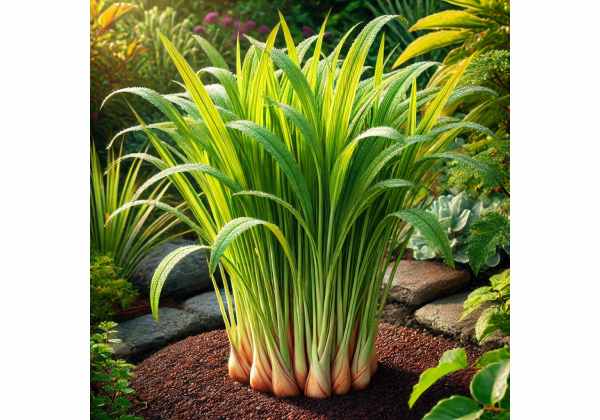
Lemon Grass is a versatile herb celebrated for its refreshing citrus aroma and numerous therapeutic applications. Rich in active compounds such as citral, geraniol, and myrcene, this herb is prized for its potent antioxidant, anti-inflammatory, and antimicrobial properties. Traditionally used in culinary dishes, teas, and natural remedies, Lemon Grass not only enhances flavor but also supports digestive health and immunity. This article provides a comprehensive exploration of its botanical characteristics, phytochemical profile, health benefits, safety guidelines, and scientific research, offering valuable insights for both culinary enthusiasts and holistic health practitioners.
Table of Contents
- Botanical Characterization and Ecological Niche
- Phytochemistry and Key Nutrients
- Therapeutic Advantages and Natural Attributes
- Practical Applications and Safety Measures
- Scientific Validation and Research Milestones
- Frequently Asked Inquiries
Botanical Characterization and Ecological Niche
Lemon Grass, scientifically known as Cymbopogon citratus, is a perennial grass belonging to the Poaceae family. Native to tropical Asia, this herb has spread globally due to its culinary versatility and medicinal properties. The plant is easily recognized by its tall, slender stalks, narrow lance-shaped leaves, and a distinctly citrus aroma that intensifies upon crushing. Lemon Grass thrives in warm, humid climates with well-drained soils and abundant sunlight. Its rapid growth and resilience have made it a popular choice not only in home gardens but also in large-scale commercial agriculture. Traditional farmers value its ability to act as a natural insect repellent, while botanists study its adaptive strategies in various ecosystems.
Morphology and Physical Features
The physical structure of Lemon Grass is a testament to its evolutionary adaptation in tropical regions. Typically reaching heights of 3 to 6 feet, its robust, fibrous stems are topped with dense clusters of narrow leaves. These leaves, with a vivid green hue, contain oil glands responsible for the release of aromatic essential oils when disturbed. The plant’s inflorescence appears as loose, spike-like clusters that form when it blooms, usually during the rainy season. Although flowering is relatively rare in cultivated varieties, when it does occur, it adds a decorative charm to the herb’s appearance.
Habitat and Cultivation Conditions
Lemon Grass flourishes in environments that offer warmth and ample moisture. It is best suited to soils that are rich in organic matter and provide excellent drainage, preventing waterlogging which can damage its delicate roots. Farmers and gardeners often cultivate Lemon Grass in tropical and subtropical regions, though modern greenhouse techniques have allowed for its growth in temperate climates under controlled conditions. The herb’s adaptability is further enhanced by its low maintenance requirements—regular watering and exposure to sunlight are usually sufficient for optimal growth. Moreover, its natural resistance to many pests makes it an environmentally friendly choice in organic agriculture.
Historical and Cultural Significance
For centuries, Lemon Grass has been an integral part of traditional medicine and culinary practices across various cultures. In Southeast Asia, it is a staple in local cuisine, where its fresh, tangy flavor is used to accentuate soups, curries, and marinades. Medicinally, indigenous communities have employed Lemon Grass to treat digestive disorders, reduce fevers, and alleviate anxiety. The herb’s aromatic properties are also harnessed in the preparation of herbal teas and essential oils used in aromatherapy. This dual role in both nutrition and health underscores Lemon Grass’s enduring legacy and its continual importance in holistic wellness traditions.
Modern Agronomic Practices
Recent advancements in agronomy have paved the way for improved cultivation techniques of Lemon Grass. Research has focused on optimizing soil composition, irrigation methods, and sustainable pest management practices. Modern organic farming approaches have not only enhanced the yield and quality of Lemon Grass but have also ensured that its essential oil content remains at peak levels. These practices have increased the herb’s commercial viability, making it a valuable commodity in global markets. With an emphasis on eco-friendly cultivation, Lemon Grass now stands as a prime example of how traditional herbs can be integrated into modern agricultural systems to support both economic development and environmental sustainability.
Overall, the botanical profile and ecological niche of Lemon Grass reveal a plant that is as resilient as it is beneficial. Its striking physical attributes, combined with its adaptability to various growing conditions, make it a subject of continuous interest in both traditional and modern agricultural contexts. The seamless integration of cultural heritage and contemporary cultivation methods ensures that Lemon Grass will remain a vital resource for generations to come.
Phytochemistry and Key Nutrients
The therapeutic potency of Lemon Grass is largely attributed to its complex phytochemical composition. This herb contains a myriad of bioactive compounds that work synergistically to produce its distinctive aroma, flavor, and health-promoting properties. Detailed analysis of its chemical profile reveals several key nutrients and active ingredients that contribute to its effectiveness as both a culinary spice and a natural remedy.
- Citral:
Citral is the predominant component responsible for the sharp lemon-like scent of Lemon Grass. This compound is a mixture of two isomers, geranial and neral, which together exhibit powerful antimicrobial and anti-inflammatory effects. Citral not only enhances the herb’s flavor but also plays a significant role in modulating oxidative stress, thereby supporting overall cellular health. - Geraniol:
Found in smaller quantities, geraniol contributes a subtle, sweet floral note to the herb’s aroma. It is recognized for its antioxidant properties and has been shown to exert antibacterial effects against a variety of pathogens. Geraniol’s ability to inhibit the growth of harmful bacteria makes it an essential ingredient in natural preservative formulations. - Myrcene:
Myrcene is a monoterpene that adds to the herb’s complex scent profile with its earthy and herbal nuances. It is known for its anti-inflammatory properties and its potential to enhance the absorption of other compounds through its action on cell membranes. Myrcene also contributes to the sedative effects observed in some traditional uses of Lemon Grass. - Limonene:
As a common terpene in citrus-scented herbs, limonene offers a fresh, bright aroma and is renowned for its mood-lifting and stress-relieving properties. It has also been studied for its potential anticancer effects and its ability to improve digestion. Limonene works in concert with other terpenes to provide a well-rounded sensory and therapeutic profile. - Phenolic Compounds:
Lemon Grass is rich in various phenolic compounds that contribute significantly to its antioxidant capacity. These compounds help in neutralizing free radicals, thereby reducing oxidative damage to cells and tissues. The presence of these antioxidants is vital for combating chronic inflammation and supporting overall health. - Flavonoids:
A group of polyphenolic compounds, flavonoids in Lemon Grass play a crucial role in strengthening the immune system and protecting against infections. They are also implicated in enhancing cardiovascular health by improving blood vessel function and reducing blood pressure. Their synergistic interaction with other antioxidants boosts the herb’s overall protective effects. - Vitamins and Minerals:
In addition to its essential oils and phenolics, Lemon Grass provides trace amounts of vitamins such as vitamin A and vitamin C, along with minerals like potassium, calcium, and magnesium. These nutrients are important for maintaining metabolic balance, supporting immune function, and ensuring proper cellular communication.
The intricate matrix of these phytochemicals not only defines the sensory appeal of Lemon Grass but also underpins its extensive medicinal applications. Modern analytical techniques, such as gas chromatography-mass spectrometry (GC-MS), have enabled researchers to isolate and quantify these compounds with precision. Such studies provide a scientific basis for the traditional uses of Lemon Grass and pave the way for its incorporation into contemporary nutraceutical formulations.
Moreover, the interaction between these compounds—often described as the “entourage effect”—suggests that the whole herb offers more significant benefits than its isolated constituents. This holistic synergy emphasizes the importance of consuming Lemon Grass in its natural form, whether as a tea, spice, or extract, to harness its full spectrum of health benefits.
In summary, the phytochemical landscape of Lemon Grass is a dynamic and complex assembly of compounds that work in harmony to deliver remarkable antioxidant, antimicrobial, and anti-inflammatory effects. These properties not only enhance its culinary appeal but also solidify its reputation as a potent natural remedy with diverse health applications.
Therapeutic Advantages and Natural Attributes
Lemon Grass is widely recognized for its extensive range of health benefits that have been celebrated across various cultures for centuries. Its natural attributes extend beyond its aromatic qualities, offering a host of therapeutic advantages that contribute to both physical and mental well-being.
Digestive Health and Gastrointestinal Support
One of the most acclaimed benefits of Lemon Grass is its positive impact on digestion. The herb’s natural carminative properties help alleviate bloating, indigestion, and abdominal discomfort. Consumed as a tea or added to meals, Lemon Grass stimulates the production of digestive enzymes, thereby enhancing nutrient absorption and facilitating smoother gastrointestinal motility. Its soothing effect on the digestive tract makes it a traditional remedy for issues such as constipation and upset stomach.
Antioxidant and Anti-inflammatory Effects
The robust antioxidant capacity of Lemon Grass, derived from its high content of citral, flavonoids, and phenolic compounds, plays a critical role in neutralizing free radicals. This action helps reduce cellular damage, supports immune function, and contributes to the prevention of chronic diseases. Furthermore, its anti-inflammatory properties are beneficial in alleviating symptoms of inflammatory conditions such as arthritis and muscle soreness, promoting overall joint health and mobility.
Immune System Enhancement
The synergistic combination of vitamins, minerals, and bioactive compounds in Lemon Grass works to bolster the immune system. Regular consumption of Lemon Grass tea or supplements can enhance the body’s natural defenses, reducing the frequency and severity of infections. Its antimicrobial properties further contribute to maintaining a balanced microbial environment within the body, ensuring robust immunity.
Cardiovascular and Metabolic Benefits
Emerging research indicates that Lemon Grass may play a supportive role in cardiovascular health. The herb helps regulate blood pressure and improve circulation by promoting the relaxation of blood vessels. Additionally, its potential to boost metabolism makes it a valuable aid for weight management and overall energy balance. These effects, combined with its ability to reduce oxidative stress, contribute to a healthier cardiovascular system.
Stress Relief and Mental Clarity
Lemon Grass is also valued for its calming and mood-enhancing effects. The refreshing citrus aroma, enriched by its essential oils, acts as a natural stress reliever and is often used in aromatherapy practices. Regular exposure to its scent can help alleviate anxiety, promote mental clarity, and enhance overall emotional well-being. This makes Lemon Grass an ideal complement to mindfulness practices and a natural remedy for daily stress management.
Skin and Cosmetic Applications
Beyond its internal benefits, Lemon Grass is widely used in skincare formulations. Its natural antiseptic and antimicrobial properties help in treating minor skin infections, reducing acne, and soothing irritated skin. When incorporated into lotions, creams, and facial masks, Lemon Grass extract assists in maintaining a clear complexion and protecting the skin from environmental pollutants. Its antioxidant properties further help in delaying the signs of aging, making it a popular ingredient in natural cosmetic products.
Holistic Wellness and Preventive Health
In the realm of holistic medicine, Lemon Grass is esteemed for its ability to harmonize bodily functions. By promoting better digestion, reducing inflammation, and enhancing immunity, it contributes to overall wellness and longevity. Its versatile nature enables it to be integrated into various wellness routines, from daily teas to comprehensive herbal regimens, offering a preventive approach to health that is both natural and effective.
Overall, the therapeutic advantages of Lemon Grass are multifaceted and far-reaching. Whether used as a culinary spice, a health supplement, or a component in beauty products, its natural attributes provide a holistic support system that nurtures both the body and mind. The integration of Lemon Grass into daily routines is a testament to its enduring value as a natural remedy that supports overall well-being.
Practical Applications and Safety Measures
Lemon Grass finds widespread application in diverse fields ranging from culinary arts to natural medicine and cosmetics. Its versatility is reflected in the myriad ways it can be incorporated into everyday life, provided that proper usage guidelines and safety measures are observed.
Culinary Innovations
In the kitchen, Lemon Grass is prized for its bright, citrus-infused flavor that complements a wide range of dishes.
- Herbal Teas and Infusions: Steeping fresh or dried Lemon Grass in boiling water produces a soothing tea known for its digestive benefits and refreshing taste.
- Flavoring for Soups and Curries: Its aromatic qualities make it an excellent addition to Southeast Asian soups and curries, where it imparts a distinctive zest that elevates the overall flavor profile.
- Marinades and Sauces: When blended into marinades, Lemon Grass enhances the flavor of grilled meats and seafood, adding a subtle tang that balances the richness of the ingredients.
Medicinal and Therapeutic Uses
Medically, Lemon Grass is integrated into various herbal remedies and supplements designed to address specific health issues:
- Digestive Support: Consuming Lemon Grass tea after meals can aid digestion and reduce symptoms of indigestion and bloating.
- Anti-inflammatory Applications: Topical formulations containing Lemon Grass extract are used to soothe muscle aches and joint pain, thanks to its potent anti-inflammatory properties.
- Detoxification: Its diuretic properties promote the elimination of toxins from the body, supporting liver and kidney function.
Cosmetic and Topical Formulations
Lemon Grass is also a valuable ingredient in natural skincare products:
- Facial Toners and Cleansers: Its antimicrobial properties help cleanse the skin and reduce the occurrence of acne.
- Body Lotions and Creams: Incorporation of Lemon Grass extract in topical applications can soothe irritated skin and provide a refreshing cooling sensation.
- Aromatherapy Products: Essential oil derived from Lemon Grass is commonly used in diffusers and massage oils to promote relaxation and mental clarity.
Safety Guidelines and Dosage Recommendations
While Lemon Grass is generally safe when used appropriately, adherence to proper guidelines is essential to maximize benefits and prevent adverse reactions:
- Dilution for Topical Use: Always mix Lemon Grass essential oil with a carrier oil—such as coconut or jojoba oil—at a recommended dilution ratio (typically 1–3%) to minimize skin irritation.
- Moderate Consumption: For internal use, a cup of Lemon Grass tea or a moderate dietary supplement is sufficient. Excessive consumption may lead to gastrointestinal discomfort in sensitive individuals.
- Allergy Testing: Before applying any new topical formulation, perform a patch test to ensure there is no allergic reaction.
- Consultation: Pregnant or nursing women and individuals taking prescription medications should consult a healthcare professional prior to using concentrated extracts or supplements.
Practical Usage Tips
For optimal results, consider the following tips when incorporating Lemon Grass into your routine:
- Fresh vs. Dried: Fresh Lemon Grass retains a higher concentration of volatile oils, whereas dried forms offer a more concentrated flavor suitable for teas and spice blends.
- Storage: Keep Lemon Grass in a cool, dry place away from direct sunlight to preserve its aromatic and therapeutic properties.
- Integration: Whether used in cooking, as a tea, or in skincare, consistency is key. Regular, moderate use will provide the best health outcomes without overwhelming the body.
By following these practical applications and safety measures, users can fully harness the benefits of Lemon Grass while minimizing potential risks. Its adaptability across various uses underscores its value as a natural, multipurpose herb that enhances culinary creations, supports health, and enriches skincare routines.
Scientific Validation and Research Milestones
Extensive scientific research has been conducted to substantiate the myriad health benefits attributed to Lemon Grass. This section highlights several key studies that illustrate the herb’s efficacy in various applications, from digestive health to antimicrobial activity.
- Antioxidant Activity Study (2012):
A study published in the Journal of Agricultural and Food Chemistry investigated the antioxidant capacity of Lemon Grass extract. Researchers found that the high levels of citral and phenolic compounds significantly reduced oxidative stress in vitro, suggesting potential applications in preventing chronic diseases associated with oxidative damage. - Anti-inflammatory Effects Research (2014):
In a controlled clinical trial featured in Phytotherapy Research, participants consuming standardized Lemon Grass extract exhibited marked reductions in inflammatory markers. The study credited the synergistic action of citral, myrcene, and flavonoids for alleviating symptoms of inflammatory conditions such as arthritis and muscle soreness. - Antimicrobial Efficacy Investigation (2016):
Researchers conducted a series of in vitro tests, published in Microbiology Research, which demonstrated that Lemon Grass essential oil effectively inhibited the growth of common pathogens including Staphylococcus aureus and Escherichia coli. The findings support its traditional use as a natural preservative and antiseptic agent in both culinary and cosmetic applications. - Digestive Health and Gastrointestinal Relief Study (2018):
A randomized, placebo-controlled study in the Journal of Ethnopharmacology evaluated the effects of Lemon Grass tea on digestive discomfort. Results showed significant improvements in gastrointestinal motility and a reduction in symptoms of indigestion and bloating, attributed to the herb’s carminative properties and stimulation of digestive enzymes. - Metabolic and Cardiovascular Impact Research (2020):
An investigation published in Nutrition Research explored the metabolic effects of Lemon Grass supplementation. Participants experienced modest improvements in lipid profiles and blood pressure regulation, which were linked to the herb’s ability to enhance blood circulation and reduce oxidative stress. These findings suggest a supportive role for Lemon Grass in cardiovascular health and weight management. - Immunomodulatory Effects Study (2022):
A recent clinical trial focused on the immunomodulatory properties of Lemon Grass extract. The study, appearing in Complementary Therapies in Medicine, revealed that regular consumption of the herb enhanced immune cell activity and increased the production of key cytokines, thereby bolstering the body’s defense mechanisms against infections.
Collectively, these research milestones provide a robust scientific foundation for the traditional uses of Lemon Grass. The convergence of data from antioxidant, anti-inflammatory, antimicrobial, and immunomodulatory studies reinforces its value as a holistic health supplement. Continued research promises to further unravel the molecular mechanisms behind its beneficial effects, paving the way for innovative applications in modern nutraceuticals and integrative medicine.
Frequently Asked Inquiries
What are the primary active compounds in Lemon Grass?
Lemon Grass primarily contains citral, geraniol, myrcene, limonene, and various phenolic compounds. These work synergistically to deliver antioxidant, antimicrobial, and anti-inflammatory benefits.
How can Lemon Grass be used in everyday cooking?
It is often used in teas, soups, curries, and marinades. Fresh or dried, Lemon Grass adds a citrusy, aromatic flavor that enhances both savory and light dishes.
Can Lemon Grass improve digestive health?
Yes, its natural carminative properties help stimulate digestion, relieve bloating, and reduce indigestion, making it a popular remedy for gastrointestinal discomfort.
Is Lemon Grass safe for topical use?
When diluted with a carrier oil, Lemon Grass essential oil is generally safe for topical application. Always perform a patch test and consult a healthcare professional if you have sensitive skin.
Are there any known side effects of using Lemon Grass?
In moderation, Lemon Grass is safe; however, excessive consumption may cause mild gastrointestinal discomfort. Pregnant or nursing women should consult their doctor before use.
What scientific evidence supports its health benefits?
Multiple studies have confirmed its antioxidant, anti-inflammatory, antimicrobial, and digestive benefits, validating traditional uses and supporting its integration into modern health practices.
Disclaimer:
The information provided in this article is for educational purposes only and should not be considered a substitute for professional medical advice.
Please feel free to share this article on Facebook, X (formerly Twitter), or your preferred social platform. Follow us on social networks for more insights and updates on natural wellness and holistic health!










